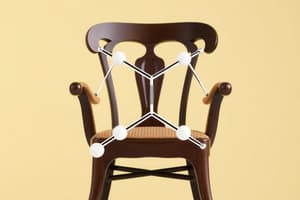Podcast
Questions and Answers
What is the major organic product of the bromination of cyclohexene?
What is the major organic product of the bromination of cyclohexene?
- Dibromocyclohexane with one chiral center
- Trans-dibromocyclohexane
- A racemic mixture of dibromocyclohexane (correct)
- Cis-dibromocyclohexane
How would you characterize the configuration of the starting alkene, cyclohexene, prior to bromination?
How would you characterize the configuration of the starting alkene, cyclohexene, prior to bromination?
- E configuration
- Neither E nor Z (correct)
- Z configuration
- Both E and Z configuration
What is the stereochemical relationship of the products formed from the hydroboration-oxidation of an alkene?
What is the stereochemical relationship of the products formed from the hydroboration-oxidation of an alkene?
- All products are meso compounds
- Products could be racemic mixtures or diastereomers (correct)
- All products are identical enantiomers
- Products have alternating stereocenters
When performing bromination at −5°C in CCl4, what type of interactions mainly govern the reaction mechanism?
When performing bromination at −5°C in CCl4, what type of interactions mainly govern the reaction mechanism?
In the context of stereochemistry, what should you include when drawing product structures from the given reactions?
In the context of stereochemistry, what should you include when drawing product structures from the given reactions?
Which structure is expected to have the most angle strain?
Which structure is expected to have the most angle strain?
Among the following chair conformations of cis-1,3-dimethylcyclohexane, which two are in equilibrium?
Among the following chair conformations of cis-1,3-dimethylcyclohexane, which two are in equilibrium?
What is the relationship between two conformations that are considered conformational enantiomers?
What is the relationship between two conformations that are considered conformational enantiomers?
What would be the expected difference in boiling points between two stereoisomers of 1,3-cyclohexanediol?
What would be the expected difference in boiling points between two stereoisomers of 1,3-cyclohexanediol?
When considering two chair conformations of α-(+)-glucopyranose, which conformation is typically the more stable one at equilibrium?
When considering two chair conformations of α-(+)-glucopyranose, which conformation is typically the more stable one at equilibrium?
How do stereo specific properties like solubility differ between stereoisomers?
How do stereo specific properties like solubility differ between stereoisomers?
What type of strain is primarily associated with eclipsed conformations?
What type of strain is primarily associated with eclipsed conformations?
What type of relationship exists if two chair conformations are identical?
What type of relationship exists if two chair conformations are identical?
Flashcards are hidden until you start studying
Study Notes
Angle, Steric and Torsional Strain
- Angle strain is caused by deviation of bond angles from ideal values (e.g., 109.5° in tetrahedral structures)
- Steric strain is caused by repulsion between non-bonded atoms or groups
- Eclipsing strain (torsional strain) is caused by repulsion between electron clouds of eclipsed bonds
Chair Conformations
- Cis-1,3-dimethylcyclohexane has two chair conformations: the conformer with both methyl groups in equatorial positions and the conformer with one methyl group axial and one equatorial
Conformational Diastereomers
- Conformational diastereomers are conformations of the same molecule that are non-superimposable mirror images
- Conformational diastereomers have different energies and can be interconverted by rotations around single bonds
Cyclohexane Conformational Stability
- In cis-1,3-dibromocyclohexane, the more stable conformer has both bromine substituents in equatorial positions
Relationship between Structures
- Two structures might be conformations of the same molecule, conformational diastereomers, conformational enantiomers, or identical
- If two structures are not conformations of the same molecule, they might be diastereomers, enantiomers
Properties of Stereoisomers
- Stereoisomers can have different physical properties such as boiling point, density, solubility, optical rotation, and dipole moment
- Taste can be influenced by chirality
α-(+)-Glucopyranose
- α-(+)-Glucopyranose has two chair conformations, one more stable than the other
- The more stable conformation has the largest number of bulky groups in equatorial positions
Bromination of Alkenes
- Bromination of alkenes can lead to the formation of stereoisomers (diastereomers or enantiomers)
- The stereochemistry of the product(s) depends on the configuration of the starting alkene (E or Z)
Hydroboration-Oxidation
- Hydroboration-oxidation of alkenes can lead to the formation of alcohols
- The stereochemistry of the product(s) depends on the configuration of the starting alkene
Hydrohalogenation
- Hydrohalogenation of alkenes follows Markovnikov's rule: the hydrogen atom adds to the carbon atom with the most hydrogen atoms
- The stereochemistry of the product(s) depends on the configuration of the starting alkene
- The reaction can be influenced by the presence of a tertiary carbocation intermediate.
Studying That Suits You
Use AI to generate personalized quizzes and flashcards to suit your learning preferences.



